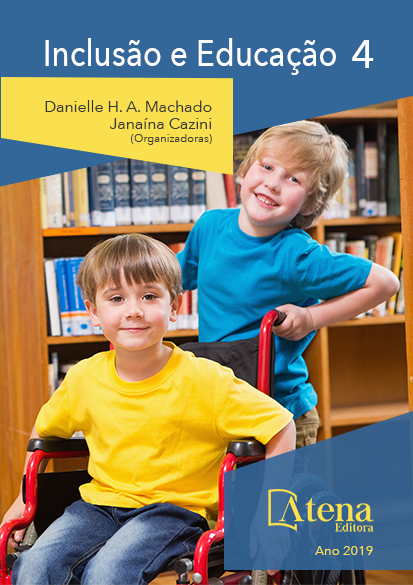
PERCEPÇÕES DE DOCENTES E DE DISCENTES EM RELAÇÃO À INCLUSÃO DE ALUNOS COM DEFICIÊNCIA NA EDUCAÇÃO SUPERIOR
Analisaram-se percepções de
professores e alunos de uma universidade
federal em relação à inclusão de alunos com
deficiência na Educação Superior. Foram 357
participantes: 15 alunos com deficiência; 100
alunos que não tinham colega com deficiência
em sala de aula; 100 alunos que tinham colega
com deficiência em sala de aula; 42 professores
de alunos com deficiência; 100 professores que
não tinham alunos com deficiência em sala de
aula. Utilizaram-se cinco versões diferentes
de questionários. Os resultados sinalizam que
os alunos são mais favoráveis à Inclusão do
que os professores, e isso ocorre, segundo
Moreira (2004), pois, ao receberem alunos com
deficiência na universidade, os professores
com carência de formação adequada enfrentam
situações desafiadoras que, na maioria das
vezes, desconhecem as especificidades,
as estruturas de apoio e os recursos que
esses alunos precisam para terem acesso ao
conhecimento acadêmico, podendo contribuir
para o desenvolvimento de atitudes negativas
acerca da deficiência por parte desses
professores. Os professores da universidade
pesquisada aceitam a inclusão dos alunos com
deficiência na educação superior, no aspecto
ideológico, mas quanto à operacionalização
das práticas pedagógicas visando garantir a
permanência com êxito na aprendizagem e na
conclusão das graduações desses alunos, suas
atitudes já não são tão favoráveis.
PERCEPÇÕES DE DOCENTES E DE DISCENTES EM RELAÇÃO À INCLUSÃO DE ALUNOS COM DEFICIÊNCIA NA EDUCAÇÃO SUPERIOR
-
DOI: 10.22533/at.ed.32219150123
-
Palavras-chave: Educação superior. Deficiência. Atitudes. Inclusão.
-
Keywords: Higher education. Disability. Attitudes. Inclusion.
-
Abstract:
An analysis of the perceptions of
teachers and students of a federal university
regarding the inclusion of students with
disabilities in Higher Education. There were
357 participants: 15 students with disabilities;
100 students who did not have classmates
with disabilities in the classroom; 100 students
who had classmates with disabilities in the
classroom; 42 teachers of students with
disabilities; 100 teachers who did not have
students with disabilities in the classroom. Five
different versions of questionnaires were used.
The results indicate that students are more
favorable to Inclusion than teachers, and that
happens, according to Moreira (2004), because,
when receiving students with disabilities at the
university, teachers with a lack of adequate training face challenging situations; in most
times, they are unaware of the specificities, support structures and resources that these
students need to have access to academic knowledge, and all that might contribute to
the appearance of negative attitudes from those teachers regarding disability issues.
From an ideological point of view, the professors of the researched university accept the
inclusion of students with disabilities in higher education, but as to make pedagogical
practices operational, in order to guarantee these students’ successful learning and
graduation, the teachers’ attitudes are no longer so favorable.
-
Número de páginas: 15
- Thelma Helena Costa Chahini
- Sadao Omot


